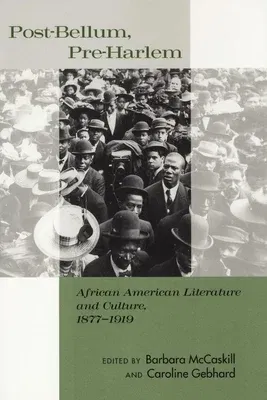The years between the collapse of Reconstruction and the end of World
War I mark a pivotal moment in African American cultural production.
Christened the "Post-Bellum-Pre-Harlem" era by the novelist Charles
Chesnutt, these years look back to the antislavery movement and forward
to the artistic flowering and racial self-consciousness of the Harlem
Renaissance.
Post-Bellum, Pre-Harlem offers fresh perspectives on the literary
and cultural achievements of African American men and women during this
critically neglected, though vitally important, period of our nation's
past. Using a wide range of disciplinary approaches, the sixteen
scholars gathered here offer both a reappraisal and celebration of
African American cultural production during these influential decades.
Alongside discussions of political and artistic icons such as Booker T.
Washington, W.E.B. Du Bois, Henry Ossawa Tanner, and James Weldon
Johnson are essays revaluing figures such as the writers Paul and Alice
Dunbar-Nelson, the New England painter Edward Mitchell Bannister, and
Georgia-based activists Lucy Craft Laney and Emmanuel King Love.
Contributors explore an array of forms from fine art to anti-lynching
drama, from sermons to ragtime and blues, and from dialect pieces and
early black musical theater to serious fiction.
Contributors include: Frances Smith Foster, Carla L. Peterson,
Gwendolyn DuBois Shaw, Audrey Thomas McCluskey, Barbara Ryan, Robert M.
Dowling, Barbara A. Baker, Paula Bernat Bennett, Philip J. Kowalski,
Nikki L. Brown, Koritha A. Mitchell, Margaret Crumpton Winter, Rhonda
Reymond, and Andrew J. Scheiber.

